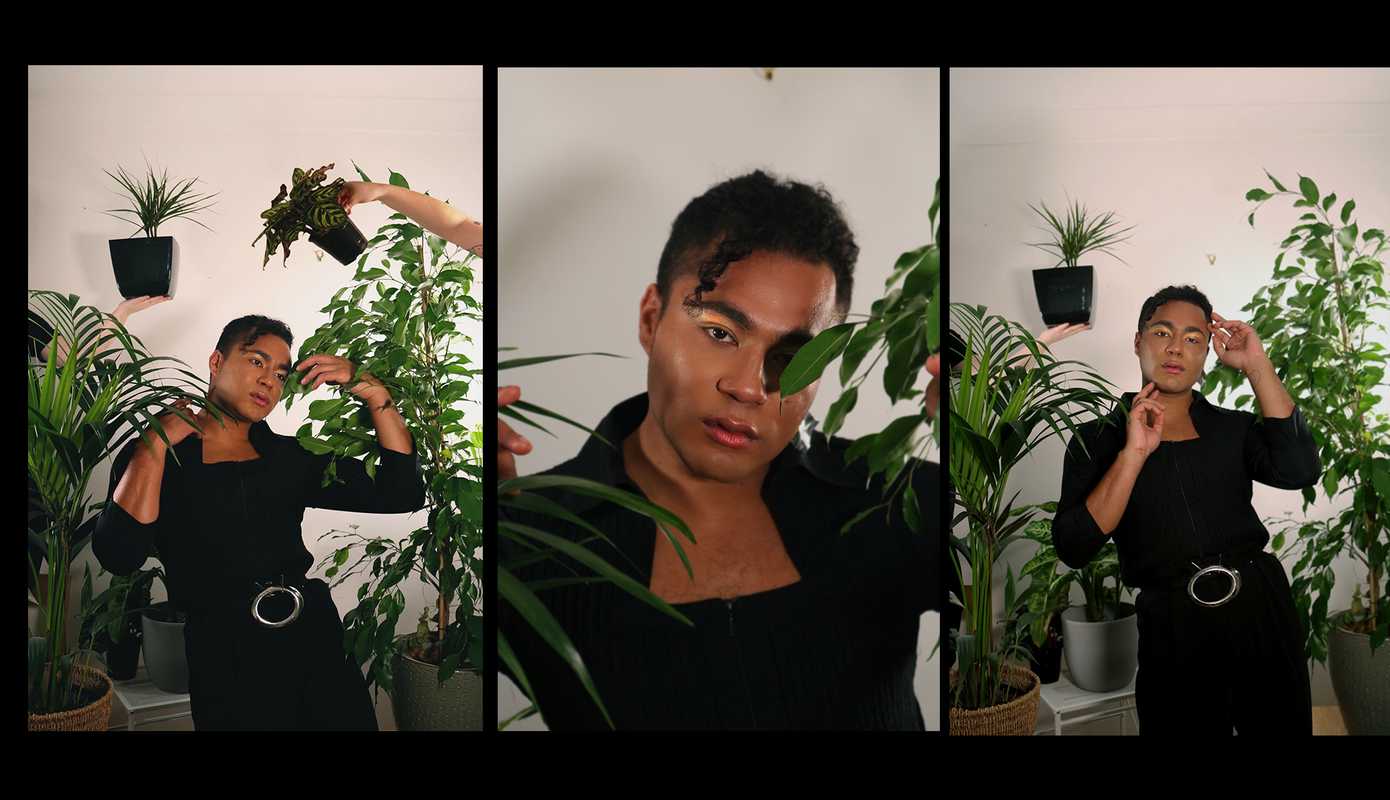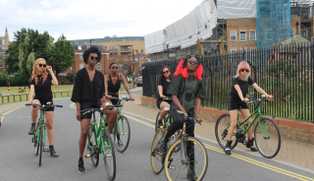Travis Alabanza has a laugh that illuminates the room. The performance artist and writer may negotiate heavy-handed and difficult topics in their work, but there is a certain lightness that they carry with them. Reading about them in mainstream media, it’s easy to pigeonhole Travis: a trans-feminine, queer, angry artist of colour. In truth, who they are as a person is in direct opposition with how their public persona has been represented. Their work may be rooted in trauma but Travis radiates joy, a feeling which is shared in abundance from the minute I meet them for a drink at a nondescript bar in South London.
Since bursting onto the cultural sphere in a now-infamous incident, Travis has gone on a journey they could never have predicted. Travis, who released their first chapbook and had won a leading role in the stage adaption of Derek Jarman’s anarchic punk film, Jubilee, was denied entry into the women’s changing room at a Topshop in Manchester. It was 2017 and the store had changed to a gender-neutral changing room policy. Travis reminded staff of this who told them to go to a Topman instead. Leaving the store, they tweeted about the incident. Overnight, Travis woke up to over ten thousand notifications on their phone. They were trending on Twitter. Two years later, like a niggling cough, they can’t seem to shake off the incident.
“All relationships [with publications] are built off of performance… Perform trauma, perform aggression. As soon as I started being more nuanced and reflective, none of these places wanted to hit me up. Suddenly, the media was less interested in me as a poster person because I was giving a voice to something a bit more complicated.” It very much became a game of “we can watch you, but only if we can watch you in the way we want to watch you,” Travis explains.
In their desire to grab your attention as quickly as possible, the media has painted Travis – a young, Black, trans artist – as a clickbait item. The same media that are happy to publicise conversations around seemingly insipid notions of gender-neutral changing rooms and pronouns, ignore the very thing Travis wants to highlight: trans violence. “We’re trapped on this 2D narrative of ‘I want you to be yourself and I love you for yourself’ but people die because they are themselves,” Travis says. “The reason I get frustrated with the conversations around gender at the moment is [that] no one is talking about [its] proximity to violence. [It is] this singular narrative of ‘I want you to overcome your personal obstacles so you can be happy with yourself.’ Like, babe, I don’t have a problem with myself – the rest of the world has a problem with myself,” they quip. And there’s that laugh, warm and electric, a lightning bolt in a stormy cloud.
Born in Bristol, Travis Alabanza grew up on a council estate just outside of the city with their mother. Travis gathered friends who had similar interests – expressive, artistic and wanting to party – and started to shape parts of their identity in the context of Bristol nightlife. As they grew older and became more self-aware of who they were – “neither this nor that” – they noticed there was a distinct lack of queerness in the city. “I was going to this gay bar and I started to be conscious of the racial experiences I was having [realising] I was way too young to be having them. There was a moment in the club where I had this intense racial experience. [I realised] this is happening because I’m both this and this. So, I started to search.” Noticing that there wasn’t a version of themselves anywhere they looked closer to home, Travis looked abroad. At 17, they applied to a summer camp in Oakland, California. They got in and fundraised to fly across the Atlantic. “The U.S already had a language for what was happening,” they explain. “It was a groundbreaking, changing experience. It was the first time I was around a group of 20 queer and young trans people. It formed a lot of my early politics and what I wanted to do. It opened my eyes.”
Encountering individuals using pronouns outside of he/she for the first time, Travis found that it was also the first time someone had asked about their gender. It ignited something in the artist. It also made them realise that they shouldn’t have to go abroad to find themselves. “We’re still having what I think is an unhealthy relationship with U.S language and politics,” they state. “I think the language [at that time] around activism and identity hadn’t grown to hold our complexities in it. Black queer stuff hasn’t been funded in the same way. If they continue to make us feel like it’s [all happening] over there, we’ll never address our shit.”
Coming back to the U.K, they moved to London and found queer theatre artists performing in bars. “This was in the milk era when everyone was pouring milk on themselves,” they say cheekily, reminiscing on their early performances. They went on to become the youngest recipient of the artist in residence at the Tate workshop programme. And then in 2017, the Topshop incident occurred. “It did change my life,” Travis says, suddenly sullen. “It was a horrible moment that put me on the map as someone who is agitating in their politics and their spaces. It changed my security issues. I’m doing a balancing act of being an artist, trying to be an artist, always saying that I’m an artist.” Since 2017, this heavily politicised image of Travis is what the media has latched onto, especially when it comes to their latest show, Burgerz.
The performance has received rave reviews from nearly every critic. It has been lauded on social media with audiences astounded at the depths to which it plummets and the emotions that arise. Nina Lyndon and Sam Curtis Lindsay, of Hackney Showroom, allowed Travis to have the space they required for Burgerz to breathe. Coming on as producers, they helped edit it but didn’t set a time limit for its run. “It felt so invaluable,” Travis gushes. “They taught me how to make it a show.” Showing first at Hackney Showroom in 2018, the show’s success meant that 2019 was spent touring it around the country, including at the coveted Edinburgh Fringe Festival where they performed at the famous Traverse Theatre. Burgerz ends the year with a landmark 3-day run at the coveted Southbank Centre in London.
“When I made it, and when I was making it, [I thought], this has been the show that will be my piece,” Travis says. “I could feel when I was writing it, [it felt] very different to what I was writing before. It felt like I was maturing. I was making bold choices I hadn’t made before. I was thinking about my work more intentionally. I think before, I was making stuff to do in a club. Make make make, perform, make make make, do another performance. With Burgerz, I wanted something that takes time and has time. I was catching up to other people calling me an artist.”
With the success of Burgerz, Travis is being given more space to perform the ideas that matter to them. They are already working on their next show along with a piece that will have 14 to 21-year-olds as the main cast. In entering festivals and performing in iconic theatres, Travis has been lauded for being groundbreaking in the art they create. Most artists would reflect on this with pride. For Travis, it is with a healthy dose of apprehension. Though they gloss over it initially, instead discussing Frank Ocean’s Prep+ party (we both agreed it would be tepid), and how the U.K needs to catch up with the U.S in terms of the discourse around trans issues (it’s still decades behind), and the ills of social media (Mumsnet target Travis constantly), Travis is brought back to their feelings of wistful apprehension when it comes to their success.
When pushed on it, they take a minute and then say, “I was thinking about how our entrance to visibility as trans femme people is a choice all the time – that’s the only [way] we garner power and respect. I don’t think it’s a coincidence that we ended up on stage, the only way to relate to trans feminine people is on stage. What I long for is a place where we can opt in or opt out, choose to be invisible if want to, choose to be visible if we want to. Choose to ‘work your ass queen’ if we want to, and still be deemed with respect and liberty. True liberation is about consent and choice. I wonder if our relationship to performance is a toxic one. We’re there because it’s the only realm that we know how to be in, you know?”
Travis Alabanza’s show Burgerz is on at the Southbank Centre until 1st Dec. Get tickets here.
Image by Faith Aylward, styling by Mia Maxwell.



